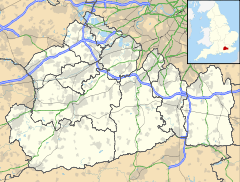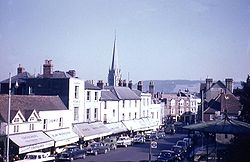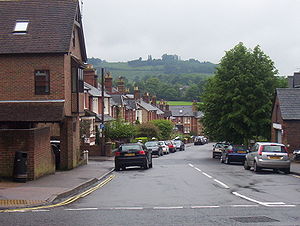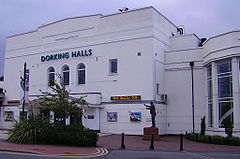- Dorking
-
This article is about the market town in Surrey. For other uses, see Dorking (disambiguation).
Coordinates: 51°14′02″N 0°19′54″W / 51.2340°N 0.3318°W
Dorking 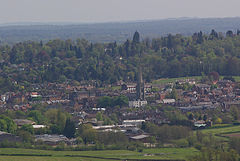
Dorking from Denbies Hillside
 Dorking shown within Surrey
Dorking shown within SurreyPopulation 17,000 OS grid reference TQ165496 District Mole Valley Shire county Surrey Region South East Country England Sovereign state United Kingdom Post town Dorking Postcode district RH4 Dialling code 01306 Police Surrey Fire Surrey Ambulance South East Coast EU Parliament South East England UK Parliament Mole Valley List of places: UK • England • Surrey Dorking (
 /ˈdɔrkɪŋ/) is a historic market town at the foot of the North Downs approximately 25 miles (40 km) south of London, in Surrey, England.
/ˈdɔrkɪŋ/) is a historic market town at the foot of the North Downs approximately 25 miles (40 km) south of London, in Surrey, England.Contents
History and development
Dorking began life as a small staging on Stane Street, the Roman Road that linked London to Chichester on the English Channel.
Dorking appears in Domesday Book of 1086 as the Manor of Dorchinges. It was held by William the Conqueror. Its domesday assets were: one church, 3 mills worth 15s 4d, 16 ploughs, 3 acres (1.2 ha) of meadow, woodland and herbage worth 88 hogs. It rendered £18.[1]
Subsequent Lords of the Manor were to include the Dukes of Norfolk, who lived in Dorking until they moved to Arundel. One of them is buried in Dorking churchyard. In the Medieval period, Dorking was a prosperous agricultural and market town, benefitting from its position on the junction of a number of important roads and tracks.
In 1750, the construction of a Turnpike Road made Dorking a staging post on the route to Brighton and the coast. The Bull's Head in South Street had a famous coachman, William Broad, whose portrait hangs in Dorking Museum in West Street. The inn that now dominates the centre of Dorking, the White Horse, was developed in the 18th century; previous buildings on this site having belonged to the Knights Templar and later the Knights of St John.
Dorking held a big wheat and cattle market in the High Street. The poultry market was held in the corner of South Street and round Butter Hill. Here the famous Dorking fowl were sold. This breed, which has 5 claws instead of the normal four, was a favourite for 19th century tables, including Queen Victoria's.
Dorking lost its stage coaches when the railways arrived, but now attracted wealthy residents who built large houses in and around Dorking, such as Denbies House and Pippbrook House (now the library, with Council Offices in the grounds). Surrounding land and beauty spots such as Cotmandene and Box Hill were donated by landowners for public use and this, together with later planning controls, has enabled Dorking to remain one of the most pleasant towns within convenient reach of London, having escaped much of the modern development witnessed by its neighbours. [Overell, B. 2005, Dorking Local History Group].
A game resembling rugby was once played here. The two sides were unlimited in number, representing the east and west of the town. The goals were the 2 bridges on the Pipp Brooke. The Town crier kicked off the ball at 2 o' clock and stopped play at 6 o'clock. The game was started at the Church gates and was "rioted" up and down the High Street. It was ceased in 1897 after complaints by tradesmen and it was officially stopped under section 72 of the Highway Act 1835.
Geography
Just north of the town the River Mole cuts a steep-sided valley through the North Downs. On the left bank is Denbies Vineyard, the largest vineyard in the UK[2] On the right bank is Box Hill, owned by the National Trust and Britain's first Country Park. The hill has been designated a Site of Special Scientific Interest, because of the large number of rare orchids, which grow there in the summer.
Further north is Norbury Park, which contains the Druids Grove, a forest of ancient yew trees, some of which are more than 1000 years old[citation needed]
To the south west of the town is Leith Hill, also owned by the National Trust, the highest point in the south east of England, reaching 1,000 ft (300 m) at the tower on top of the hill. Along with the adjacent hills of Holmbury Hill and Pitch Hill, as well as the nearby escarpment of the North Downs from Box Hill to Newlands Corner, the area is known as 'The Surrey Hills'.
A new species of fish-eating dinosaur, Baryonyx walkeri was discovered in clay pits just south of Dorking. The creature had a long curved claw on each hand and remains of its last meal were discovered fossilised in its ribcage. The skeleton can be seen at the Natural History Museum in London. One disused clay pit (Inholms lane) is now open to the public as a nature reserve.
Climate
Dorking experiences an oceanic climate (Köppen climate classification Cfb) similar to almost all of the United Kingdom.
Climate data for Dorking Month Jan Feb Mar Apr May Jun Jul Aug Sep Oct Nov Dec Year Average high °C (°F) 8
(46)8
(46)11
(52)13
(55)17
(63)20
(68)22
(72)23
(73)19
(66)15
(59)11
(52)8
(46)15 Average low °C (°F) 2
(36)2
(36)3
(37)3
(37)6
(43)9
(48)11
(52)11
(52)8
(46)7
(45)4
(39)2
(36)6 Precipitation mm (inches) 69.5
(2.736)64.5
(2.539)43.7
(1.72)48.6
(1.913)56.9
(2.24)32.0
(1.26)51.3
(2.02)37.0
(1.457)46.9
(1.846)103.8
(4.087)91.7
(3.61)90.7
(3.571)736.6
(29)Source: [3] Modern Dorking
Wathen Road, where Laurence Olivier was born.
The evolution of Dorking has been kind to the town centre. Much of the original character survives, whilst accommodating businesses that serve the needs of the 21st century. The town is well known for its antique dealers.
The town's three main trading streets of High Street, West Street and South Street are complemented by a small open-air shopping centre, St Martin's Walk, which is adjacent to the town's main car park and easily accessed from the High Street.
In the late 1990s Dorking Halls was given a huge refit, to make it a cinema and theatre complex. In 2003, a new modern leisure centre and swimming pool were added to the Dorking Halls Complex.
There is now a big statue of the "Dorking cockerel" located on the Deepdene roundabout. This has been a controversial art installation with many claiming it is a distraction for drivers. There is even a Facebook hate page dedicated to it.
Dorking and nearby Box Hill were chosen as part of the route for the 2012 London Olympics Cycle Road Race.
Famous residents and literary connections
People born in the town include: Lord Olivier in 1907 — a blue plaque marking his birthplace can be found in Wathen Road.
Other people born in Dorking include Walter Dendy Sadler (1854–1923) artist and painter, and Queens Park Rangers F.C. Striker Jamie Mackie (born 1985).
The famous composer Ralph Vaughan Williams lived in Dorking for much of his life, and penned most of the works which made him famous in Dorking. The lark in "The Lark Ascending" is known to have been heard in the Mole Valley to the north of the town.
Absolute Radio DJ Christian O'Connell resides in Dorking with his wife and two children.
Kenneth Baker served as Member of Parliament for Mole Valley from 1983 to 1997 and lived for most of that time in Betchworth. On retirement he was made a life peer and took the title 'Kenneth Baker, Baron Baker of Dorking'.
People who have lived in the town in the past include: Daniel Defoe who attended Rev. James Fisher's boarding school in Pixham Lane, and Defoe later mentioned Dorking in his tour through the whole Island of Great Britain.[4]
Dorking also gets a mention in Defoe's book A Journal of the Plague Year,[5] as a refuge for his brother's family.
Henry Hope and his nephew Thomas Hope spent summers at Deepdene in the beginning of the 19th century. Benjamin Disraeli wrote his novel Coningsby also while staying in Deepdene House (demolished in 1967) on the outskirts of the town. Emma Holland was brought up in the town.
Dorking and its environs, including Box Hill and the Deepdene Hotel, feature heavily in British author Robert Goddard's fictional thriller Closed Circle (1993). In this novel there are also several allusions to the notorious money-for-titles trader Maundy Gregory, the owner of the Deepdene Hotel in the inter-war years.
The Cubitt family had links with the town also. Thomas Cubitt was born and lived in the town, and later built up large areas of London from the early 19th century. His politician son George also had connections with the town, and notably financed the building of St Barnabas Church on Ranmore Hill known by its nickname of Cubitt's Spire, Cubitt's Finger or Cubitt's Stump.[6]
The famous irrigation engineer Sir Arthur Cotton spent his last days, preaching the Bible and experimenting on cultivation of new wheat strains here. His tombstone at a local cemetery describes Sir Arthur as “irrigation Cotton” who was involved in construction of large scale irrigation projects, dams, aqueducts, bridges and canals in India. The Polish poet Marian Hemar is also buried at the local cemetery.
The Battle of Dorking a fictional short story written by Lt. Col. Sir George Tomkyns Chesney in 1871 was set in the town. Describing a fictional invasion and conquest of Britain, it triggered an explosion of what came to be known as invasion literature.
Graham Gouldman and Eric Stewart of the band 10cc opened a studio, Strawberry Studios South, in a former cinema in Dorking at the end of South Street in 1976 following the departure of Kevin Godley and Lol Creme. Songs recorded here include 'The things we do for love' and 'Good morning judge'. Songs recorded here by other artists include 'Ebony and Ivory' by Paul McCartney and Stevie Wonder. The building was later demolished, the site used as a builders yard for a time and a housing development now occupies the site.
1996 Grand National winner, Rough Quest was trained for the race by Terry Casey at Henfold House Stables, Beare Green, to the south of Dorking.[7]
Local government
 The "Dorking cockerel" as seen from the A24 roundabout.
The "Dorking cockerel" as seen from the A24 roundabout.
Dorking is the administrative centre of Mole Valley District Council. It had been an urban district from 1894 to 1974.
It is situated in the Mole Valley parliamentary constituency, having formerly been the centre of its eponymous predecessor, the Dorking constituency.
Twin towns
The town is twinned with Gouvieux, France since 1997 and negotiations began in 2007 to twin with the German town of Güglingen.[8]
Transport
Main article: Transport in DorkingRoad
Dorking is situated at the junction of the A24 (London to Worthing) and A25 (Maidstone to Guildford) roads.
Rail
The town has three railway stations.
- Dorking railway station, on the Epsom to Horsham Sutton & Mole Valley Line run by the (New) Southern Railway company. Additionally, South West Trains run services to London Waterloo.
- Dorking Deepdene, on the Guildford to Redhill North Downs Line.Services are run by First Great Western.
- Dorking West, also on the Guildford to Redhill North Downs Line, but served infrequently (also by First Great Western).
Bus
Most bus services are run by Arriva, the main locations served being Guildford, Redhill and Reigate including villages in between, as well as some local services. Sunray Travel operates a Surrey CC supported route to Leatherhead and Epsom, and running via Box Hill. Metrobus took over Arriva's Horsham depot, and now run route 93 to Horsham, and London Buses route 465 to Kingston.
Education
Various Primary Schools cater for 5–11 year olds:
- Powell Corderoy Primary School
- St Martin's School
- St Paul's School
- St Joseph's School
- St John's School, formerly Redlands
Secondary education is largely provided for by:
- The Ashcombe School
- The Priory School, formerly Sondes Place School (from 1996)
Emergency services
Surrey Police, Dorking Station
 Vines at Denbies Wine Estate, looking towards Ranmore Common (taken in Autumn)
Vines at Denbies Wine Estate, looking towards Ranmore Common (taken in Autumn)
Dorking is served by these emergency services:
- Surrey Police
- South East Coast Ambulance Service as of 1 July 2006. The Surrey Ambulance Service, Sussex, and Kent Ambulance services have all merged, and have now ceased to exist.
- Surrey Fire & Rescue Service, in North Holmwood
- Dorking Hospital, small hospital with no A&E.
Leisure and culture
On 15 June 2004, Dorking was granted Fairtrade Town status.
The Dorking Halls is a cinema, theatre, leisure centre and swimming pool complex. There is also an "Arts Alive" Festival which takes place annually during the last two weeks of October. Dorking Halls is also yearly host to a professional pantomime which was re-introduced in December 2006, after several years of hosting Zippo's Circus.
Dorking also has a museum, a library, about thirty pubs and a CIU affiliated club. It is noted for its antique and art shops on West Street.
The town has an active collection of sports clubs. Dorking Football Club is based in the centre of the town at Meadowbank. Dorking rugby football club which plays at Brockham attracted national attention when it won the Powergen Vase in 2005/2006.[9][10] Dorking and Mole Valley Athletics Club is based at Pixham Sports Ground. They host the annual Dorking Ten road race starting from Brockham Green.[11] The Mole Valley Bowmen are located in the grounds of St Martin's primary school.[12]
Near to Dorking lies the Leith Hill area, along with the adjacent hills of Holmbury Hill and Pitch Hill, as well as the nearby escarpment of the North Downs from Box Hill to Newlands Corner. This place is notable in southern England for mountain biking. As a whole this area is known as 'The Surrey Hills'. Also adjacent to Dorking is Denbies Vineyard. The Dorking Group of Artists exhibit locally twice a year, in Betchworth and at Denbies.[13] They celebrated their 60th anniversary in 2007.
Underneath the town lie the Dorking Caves which are open occasionally to the public.
Leith Hill Music Festival
Each year in April, the town plays host to the Leith Hill Music Festival for choirs. This was founded by the English composer Ralph Vaughan Williams in 1905. The present festival conductor is Brian Kay.[14]
References
- ^ Surrey Domesday Book
- ^ Visit Surrey
- ^ "Averages for Dorking". http://weather.msn.com/monthly_averages.aspx?wealocations=wc:9330&q=Dorking%2c+GBR+forecast:averagesm.
- ^ Notes on Defoe
- ^ A Journal of the Plague Year, 1665
- ^ Dorking Deanery - Church Histories
- ^ Henfold House Stables website. Retrieved on 30 May 2011.
- ^ Surrey Advertiser twinning info
- ^ Dorking Rugby Football Club
- ^ 2005/2006 Powergen Vase
- ^ Dorking and Mole Valley Athletics Club
- ^ Mole Valley Bowmen
- ^ Dorking Group of Artists
- ^ "Leith Hill Music Festival". http://www.lhmf.co.uk/. Retrieved 14 November 2010.
External links
Towns, villages and hamlets in the Mole Valley District of Surrey, England  Abinger · Abinger Common · Abinger Hammer · Ashtead · Beare Green · Betchworth · Brockham · Buckland · Capel · Charlwood · Coldharbour · Dorking · Fetcham · Friday Street · Great Bookham · Headley · Holmbury · Holmwood · Leatherhead · Leigh · Little Bookham · Mickleham · Newdigate · Ockley · Westcott · Westhumble ·Categories:
Abinger · Abinger Common · Abinger Hammer · Ashtead · Beare Green · Betchworth · Brockham · Buckland · Capel · Charlwood · Coldharbour · Dorking · Fetcham · Friday Street · Great Bookham · Headley · Holmbury · Holmwood · Leatherhead · Leigh · Little Bookham · Mickleham · Newdigate · Ockley · Westcott · Westhumble ·Categories:- Market towns in Surrey
- Mole Valley
- Ancient trackways in England
- Towns in Surrey
Wikimedia Foundation. 2010.

